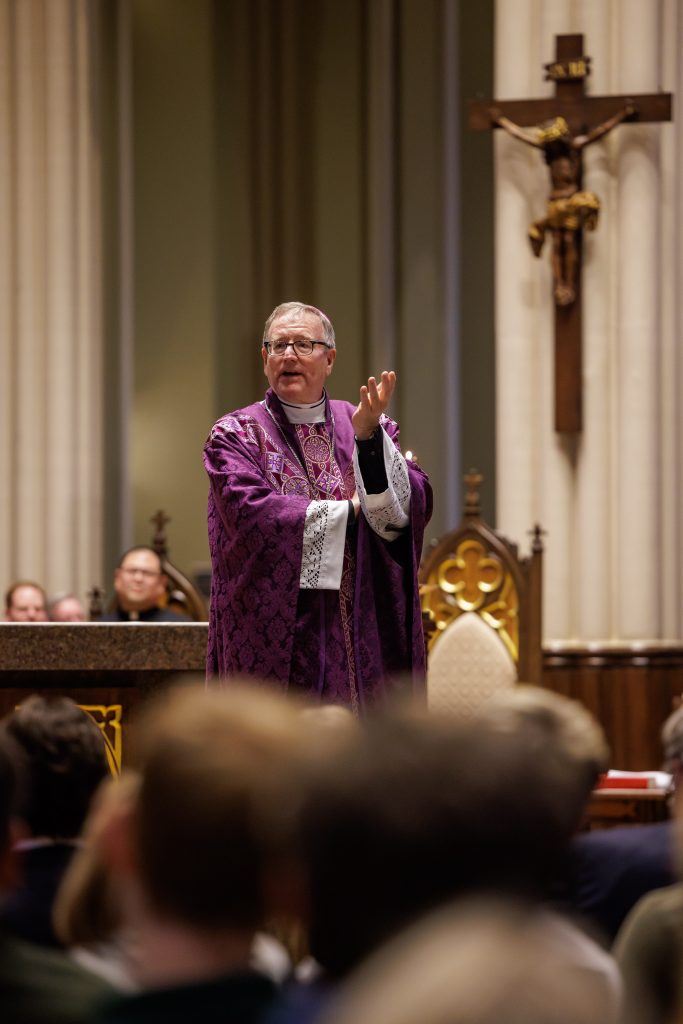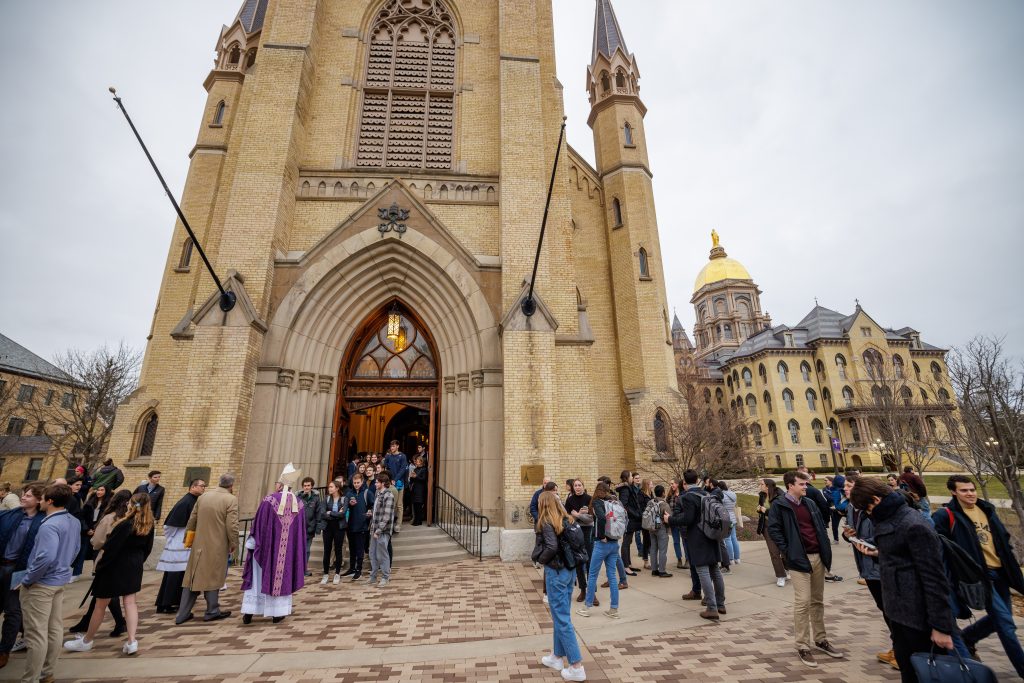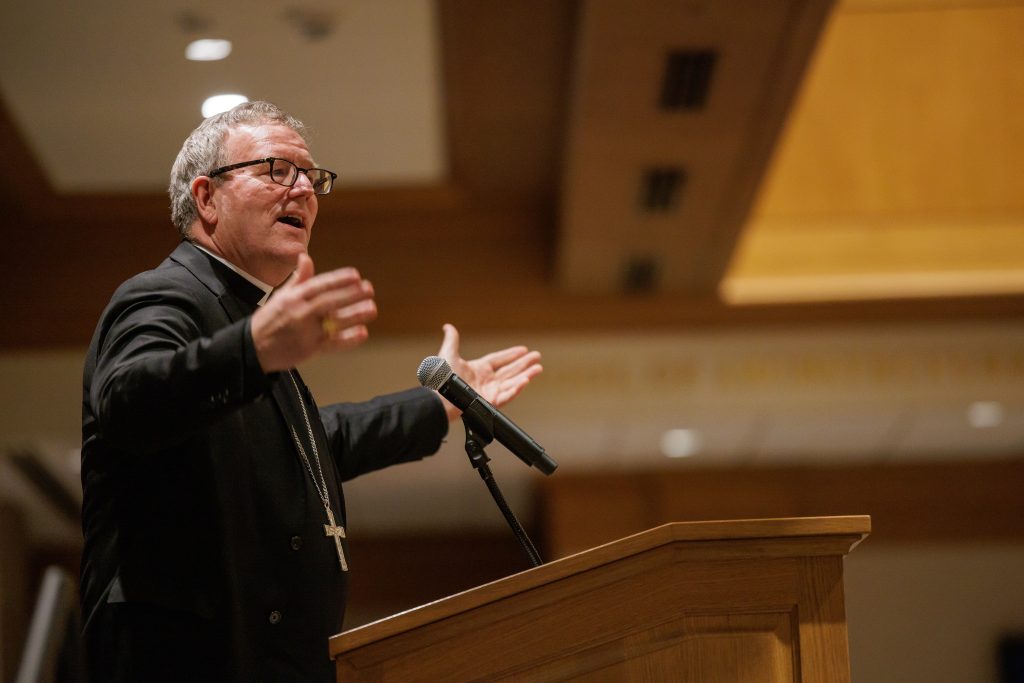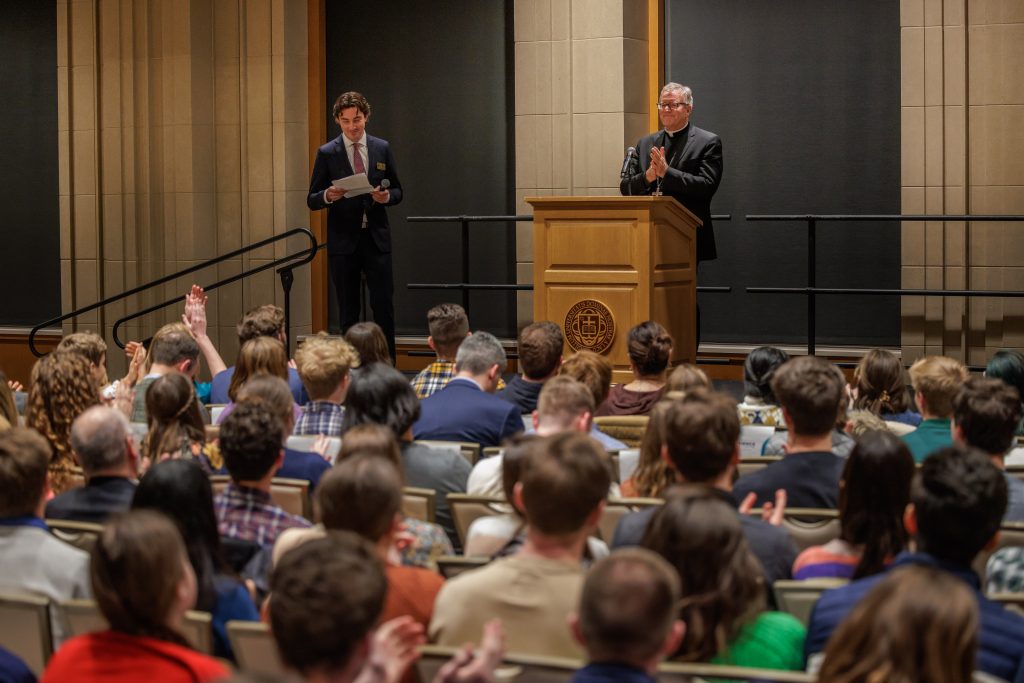March 7, 2023 // Diocese
Bishop Robert Barron Visits Notre Dame: What Makes a University Catholic?
“Ask and it will be given to you; seek and you will find; knock and the door will be opened to you.”
Jesus’ well-known invocation to his disciples inviting them to pray and seek out the Father were a foundational aspect of Bishop Robert Barron’s recent visit to the University of Notre Dame on March 2.
Barron, Bishop of the Diocese of Winona-Rochester, Minnesota, and founder of “Word on Fire” Catholic Ministries, enrolled at Notre Dame as a freshman in 1977. Although he left the following year to enter seminary for the Archdiocese of Chicago, he remarked that he always had a great affection for the university.

Photos by Peter Ringenberg/University of Notre Dame Bishop Robert Barron of the Diocese of Winona-Rochester, Minnesota, gives his homily during Mass at the Basilica of the Sacred Heart as part of his visit to the University of Notre Dame on Thursday, March 2.
Celebrating Mass at the Basilica of the Sacred Heart, he shared fond memories from his time on campus and reflected upon Jesus’ words, “to ask, seek, and knock.” Emphasizing the importance Jesus placed on petitionary prayer when giving the disciples the “Our Father,” Bishop Barron instructed those present to ask for God’s aid, guidance, and direction. Reflecting upon former President Theodore Hesburgh’s favorite prayer, “Come, Holy Spirit,” he encouraged the students to be continually open to God’s influence and to seek Him out in the midst of their studies and everyday lives.

Photo by Peter Ringenberg/University of Notre Dame
Bishop Barron greets attendees following Mass at the Basilica of the Sacred Heart at the University of Notre Dame on Thursday, March 2.
Afterwards, Bishop Barron presented a lecture in Corbett Family Hall on “What Makes a University Catholic?” The talk was co-sponsored by the de Nicola Center for Ethics and Culture, the McGrath Institute for Church Life, Campus Ministry, and Student Government.
Sharing additional details about his time on campus, Bishop Barron thanked Father Tom McNally, who was also in attendance, for the role he played in his vocational discernment. He shared, “I was thinking about the priesthood in 1977 and Father Tom recommended that I read John Henry Newman’s “Apologia pro vita sua.” That set me on a pathway I’ve never left!”
Barron returned to the campus in 2002 as a visiting scholar, teaching and researching for his book, “The Priority of Christ.” During that year, he lived at Moreau Seminary when Father Wilson (Bill) Miscamble, CSC, served as Rector and Father Pat Neary, CSC, was Vice Rector. Neary is now also a bishop and a nearby colleague of Barron’s, overseeing the Diocese of St. Cloud, Minnesota.
The central thesis of Barron’s presentation for the evening was, “A Catholic university is one in which Christ holds the central integrating and organizing place among all the circles of discipline and activities of the university.” He emphasized that “in the rose windows of Gothic churches, the center is always Christ, He provides an anchor to the whole design; all the elements of the window revolve around and find their unity in that central place. I think a great Catholic University is one in which the relationship between Christ and all the other disciplines is celebrated and explored with enthusiasm!”
Throughout his talk, he explored how the understanding of God must be the foundation upon which all disciplines are built. He reminded, “God is not a being, He is being itself. He is the very definition of what it means, ‘to be.’ He sustains all things.” Continuing, he posed the question of what would happen if the academic disciplines of math, physical science, history, literature, and law were all fundamentally rooted in a relationship with Christ?
He then briefly explored each of these topics with greater depth.

Photo by Peter Ringenberg/University of Notre Dame
In a lecture at the University of Notre Dame on Thursday, March 2, Bishop Robert Barron discusses what would happen if academic disciplines of math, physical science, history, literature, and law were fundamentally rooted in a relationship with Christ.
He said, “The origin of our idea of the eternal is found in mathematics. Numbers convey truth. When I grasp a quadratic formula, I grasp something across space and time that doesn’t change, it is an eternal order.” He continued, “all the sciences rest on the fundamental presumption that the reality they go out to meet is imbued with intelligibility, with something like a pattern or form that corresponds to the inquiring mind. In ‘Introduction to Christianity,’ Cardinal Joseph Ratzinger based his argument on this same insight, that ‘the only way to explain the universal intelligibility of our experience is through recourse to a creative and personal intelligence that has already thought it into being.’ What does it mean literally to ‘Recognize the truth?’ To re-cognize: that I am thinking about and discovering what has already been thought into it. Einstein expressed that the most incomprehensible thing about the universe is that it is comprehensible. The response from the Christian tradition is that only in recourse to a creative intelligence does it make sense.”
Based on my experience conversing with agnostics, atheists, or unbelievers who claim “we are rational, while you religious people are superstitious or stuck in the Middle Ages,” I find that they get very uncurious precisely when the questions get really interesting. When asked, “why should there be pure intelligibility at all?” I’ve often found their answer to be, ‘I don’t know, that’s just the way it is.’ But that is a very interesting question, and this is a great place to explore it! We begin with the Word: “In the beginning was the Word and the Word was with God and the Word was God, and through this Word, all things came to be.” The one responsible for all this must be something like a Logos-bearing Person. A created world isn’t divine, it is other than God, but it has been spoken intelligibly into being. I think a Catholic university is a place where these very intriguing questions like the unreasonable effectiveness of mathematics in the physical sciences can be celebrated and explored.”
Click here for more photos by Peter Rinkenberg of the visit.
On the subject of history, he remarked that most historians aim to organize events into an overarching “meta-narrative” which undergirds their philosophy. He said, “the meta-narrative of secular modernity is that there was a long period of oppression and then in the 17th and 18th centuries, there was this marvelous Enlightenment, the time of knowledge and liberty with ever greater liberation. But what is the Christian meta-narrative? We think history came to its climax outside of Jerusalem around the year 30 A.D. when this young rabbi is dying on an instrument of torture. We think the dying and the rising of the Son of God is the climax of history. The rest of time and space is the unfolding of the Lordship of Jesus, crucified and risen from the dead. What would history look like if we take seriously that that’s meta-narrative? I think a Catholic university is a place where that question should be explored.”
Regarding literature, Barron quoted American writer William Faulkner who said that “the only thing worth writing about is the human heart in conflict with itself.” He said that the line posed by St. Augustine in his “Confessions” remains fundamentally true for every human being: “Lord, you made us for yourself and our hearts are restless until they rest in You.” He said, “I am convinced that all literature is pointing in that direction, of a human heart in dramatic conflict, hungering and thirsting for God either properly or improperly directed.
Finally, on the nature of law, Barron drew attention to Martin Luther King Jr.’s “Letter from Birmingham Jail”, emphasizing the reality that there are just laws and unjust laws, but an unjust law is no law at all because it is out of harmony with God’s law. He reiterated the importance of a Catholic university being a place to explore the relationship between these natural, moral, and spiritual dimensions.
In closing, he implored Notre Dame to be proud of its Catholic identity, not to think of the Church and the university in conflict with each other. He exclaimed, the closer God is, the more alive we are. God is not in the business of supplanting us or dominating us, but rather lifting us up. The more we recover the idea of the university coming from the heart of the Church, as St. Pope John Paul II emphasized, the more the university is authentically itself.”
Afterwards, students and alumni expressed their appreciation for the event.
Jonathan Karr, a junior, shared, “it is of utmost importance that Christ and theology remain integrated with all other studies at Notre Dame. By celebrating and exploring these disciplines, we can see God at work in everything that we do. Theology doesn’t compete with the other disciplines. It allows for all the disciplines to be explored at a greater depth. Both at Mass and at the lecture, Bishop Barron said that we can pray the prayer “Come Holy Spirit” anytime no matter the situation since it always allows us to center our life towards Christ. I’m very grateful that Bishop Barron, Campus Ministry, and Student Government were able to put this together and I look forward to seeing Notre Dame continue to grow in faith.”
Robert Kloska, a parishioner of St. Matthew’s Cathedral and Notre Dame class of 1990 graduate, stated, “Bishop Barron’s love for the university and his direction to have continual recourse to the Lord, both in prayer and in academic study, are inspiring. His message serves as a reminder to seek the Lord wholeheartedly and approach intellectual pursuits with humility and openness, searching for God when His presence may not be readily apparent, but still trusting He can be found.”
The best news. Delivered to your inbox.
Subscribe to our mailing list today.







